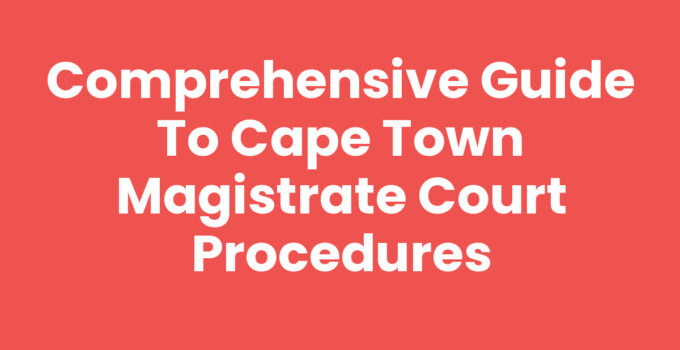When it comes to navigating the legal system, the Cape Town Magistrate Court stands as a pivotal institution. Whether you are a lawyer, a defendant, or simply someone seeking information, understanding the procedural nuances of this court can greatly enhance your experience. This guide aims to demystify the operations, benefits, and processes related to the Cape Town Magistrate Court.
Cape Town Magistrate Court: A Step-by-Step Guide
The Cape Town Magistrate Court plays a vital role in the judicial landscape of South Africa. This section explores what you need to know about its procedures.
Understanding the Structure of the Cape Town Magistrate Court
The Cape Town Magistrate Court handles a range of cases from criminal matters to civil disputes. It is divided into various courts, each responsible for specific types of cases, such as family law, small claims, and traffic violations. Knowing the court’s structure can help you navigate it more effectively.
Initiating Legal Proceedings
To bring a case before the Cape Town Magistrate Court, you must follow specific steps:
- Filing a Complaint: Begin by drafting your complaint. Ensure it adheres to the court’s prescribed format. You can find templates on the court’s official website or consult with a legal expert.
- Payment of Fees: Pay the necessary court fees. These fees vary based on the type of case you are filing. It’s crucial to pay the fees in advance to avoid delays.
- Hearing Dates: After filing, the court will assign a hearing date. Be prepared to present your case and bring all relevant documentation.
Preparation for Court
Being well-prepared can significantly impact the outcome of your case. Here’s how to prepare:
- Gather Evidence: Collect all required documents, including witness statements, photographs, and any other relevant evidence.
- Consult with a Lawyer: Legal representation can provide invaluable guidance and enhance your chances of success.
- Practice Your Testimony: Be familiar with what you will say in court. Practice articulating your key points clearly and confidently.
The Court Process
On the day of your hearing, it is essential to understand what to expect:
- Arrival: Arrive early. This allows time for security checks and to find your courtroom.
- Opening Statement: You’ll have the chance to present your case, followed by the opposing party’s statement.
- Evidence Presentation: Both parties will present their evidence and call for witnesses.
- Closing Arguments: After all evidence has been presented, both parties will take turns with closing arguments.
- Judgment: The magistrate will announce their judgment, which could occur immediately or after deliberation.
Recommended Guide: Affordable Cape Town Airport Parking Long Stay Options
Benefits of the Cape Town Magistrate Court
The Cape Town Magistrate Court offers numerous advantages:
- Accessibility: The court is generally accessible to the public, ensuring transparency in legal processes.
- Affordable Legal Services: For those with limited means, the court provides a more economical option compared to higher courts.
- Specialized Courts: Different branches of the Magistrate Court focus on specific issues, such as family law or traffic offenses, making it easier to access the appropriate judicial resources.
Further Reading: Top Quality Rubber Products And Mouldings Cape Town
Important Considerations
Before engaging with the Cape Town Magistrate Court, consider the following:
- Legal Aid: If you cannot afford a lawyer, check if you qualify for legal aid services available at the court.
- Language Barriers: Ensure you understand the proceedings; interpretation services may be available if needed.
- Emotions in Court: Legal proceedings can be stressful. Maintain composure during hearings, as emotions can negatively impact your case.
See Also: Discover the Best Travel Company Cape Town for Your Adventures
Conclusion
The Cape Town Magistrate Court is an essential part of the legal landscape in South Africa. Understanding its structure, procedures, and benefits can empower you to engage effectively within the system. Whether you are a lawyer or a layperson, employing the strategies outlined in this guide can make your experience in the Cape Town Magistrate Court more navigable.
Read Also: Adopt a Friend: Rescue Dogs for Adoption Cape Town Awaiting You
Frequently Asked Questions
What types of cases does the Cape Town Magistrate Court handle?
The court handles criminal, civil, family, and traffic cases.
How can I file a complaint at the Cape Town Magistrate Court?
You can file a complaint by drafting your case, paying necessary fees, and submitting documents to the court.
Do I need a lawyer for court proceedings?
While not mandatory, having legal representation can be beneficial for navigating the court.



